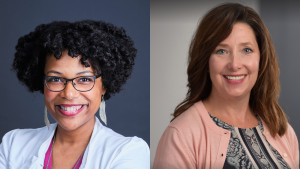Moderator: Lynn Cooper, Vice President of Marketing and Communications at Fair360, formerly DiversityInc
Panelists:
- Salma Jutt, Divisional Vice President of U.S. Commercial, Chronic Pain Therapies at Abbott (No. 4 on The Fair360, formerly DiversityInc Top 50 Companies for Diversity list in 2021)
- LaKendra Davis, Vice President of Technical Operations and Support at Cox Communications (No. 32 in 2021)
- Kristen Wells, Director of Diversity and Inclusion at Hilton (No. 1 in 2021)
- Dr. Angela Anderson, U.S. Head of Diversity and Inclusion, Operations and Strategy at Novartis Pharmaceuticals (A Fair360, formerly DiversityInc Hall of Fame company)
- and Lisa H. Robinson, Executive Vice President, Chief Operating Officer, DEI Strategy and Implementation at Wells Fargo (No. 25 in 2021)
















